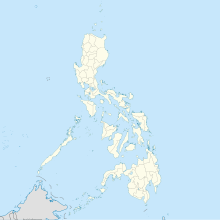The Camp Cawa-Cawa siege (Filipino: Pagkubkob sa Kampo Cawa-Cawa, Chavacano: Sitio de Campo Cawa-Cawa) was a siege of a Philippine Constabulary-Integrated National Police camp by security forces of the Philippines on January 3–5, 1989, after a rogue policeman took the camp's ranking officer hostage.
| Camp Cawa-Cawa siege | |||
|---|---|---|---|
| Date | 3 – 5 January 1989[1][2] | ||
| Location | Camp Cawa-Cawa, Zamboanga City, Philippines 6°55′17.4″N 122°4′44.4″E / 6.921500°N 122.079000°E | ||
| Caused by | Hostage-taking of a police general and his aide by a renegade policeman | ||
| Goals | Philippine security forces attempted to end ensuing siege. | ||
| Resulted in |
| ||
| Parties | |||
| |||
| Lead figures | |||
| Number | |||
| |||
| Casualties and losses | |||
| |||
Events edit
Rizal Alih, a patrolman, and several other men had been detained pending an investigation into their alleged involvement in the murder of Zamboanga City Mayor Cesar Climaco on 14 November 1984.[4] Gen. Eduardo Batalla, the regional commander of the PC-INP who had his office at the camp, had made a decision to have the detained men transferred to Manila; however, Alih refused to cooperate. Batalla had summoned the men to his office for a conference, but the talks degenerated into a heated exchange with both parties shouting at each other. Alih and his companions were able to over-power their guards and took Batalla, his aide Col. Romeo Abendan and several others hostage.
After a 3-day siege, Chief of Staff of the Armed Forces of the Philippines Renato de Villa ordered that the camp be assaulted. Philippine security forces decided to attack the camp using helicopters. Rockets deployed from the aircraft set fire to the building where Gen. Batalla was being held and it burned to the ground.[5] Batalla, Abendan and 18 other PC/INP personnel were later found burned to death.[4] Alih managed to escape the ruined camp, making his way to Basilan and eventually Sabah, Malaysia.
Aftermath edit
Alih was arrested by 69 Commando from Royal Malaysia Police on July 21 1994 in Sandakan, Sabah and charged with illegal possession of firearms.[3] He was extradited back to the Philippines in 2006.[6] He was detained in Camp Crame and died in the camp's hospital on 14 August 2015 after complaining of chest pains.[7] He was buried the next day in Zamboanga City.[8]
Commemoration edit
The Philippine National Police commemorates the deaths of Gen. Batalla and Col. Abendan every year.[1] Camp Cawa-Cawa itself was renamed Camp Brigadier General Eduardo B Batalla, and another Philippine National Police camp in Mercedes, Zamboanga City was named Camp Colonel Romeo A. Abendan in honor of the slain police officers.[2]
In popular culture edit
A film depicting the siege, Arrest: Pat. Rizal Alih – Zamboanga Massacre, was released on March 8, 1989. Directed by Carlo J. Caparas, it stars Ramon Revilla as Rizal Alih and Eddie Garcia as Brig. Gen. Eduardo Batalla.[9]
References edit
- ^ a b Reyes, Jewel (January 5, 2010). "Cawa-cawa siege commemorated". ABS-CBN News. Retrieved February 5, 2018.
- ^ a b Philippine National Police. "PRO9 History". Retrieved February 5, 2018.
- ^ a b "Top Filipino fugitive caught in Malaysia". United Press International. 18 August 1994. Retrieved 13 February 2018.
- ^ a b c Felipe, Cecille Suerte; Sison Jr., Bebot (15 August 2015). "Rebel cop Rizal Alih dies in jail at 77". The Philippine Star. Retrieved 13 February 2018.
- ^ Reyes, Dyborrhae Jewel M. (9 January 2009). "Cawa-cawa siege remembered almost 20 years after". ABS-CBN News. Retrieved 13 February 2018.
- ^ "Rizal Alih is dead". Mindanao Examiner. August 15, 2015. Archived from the original on October 5, 2020. Retrieved February 13, 2018.
- ^ Tuyay, Francisco (August 16, 2015). "Rizal Alih dies in PNP hospital". Manila Standard. Retrieved February 13, 2018.
- ^ Alipala, Julie S. (August 15, 2015). "Rizal Alih, leader of 1989 Camp Cawa-Cawa siege, passes away". Philippine Daily Inquirer. Retrieved February 13, 2018.
- ^ Dychiu, Stephanie (August 26, 2009). "The Revenge of Carlo J. Caparas (God Help Us)". GMA News. Retrieved February 10, 2018.
